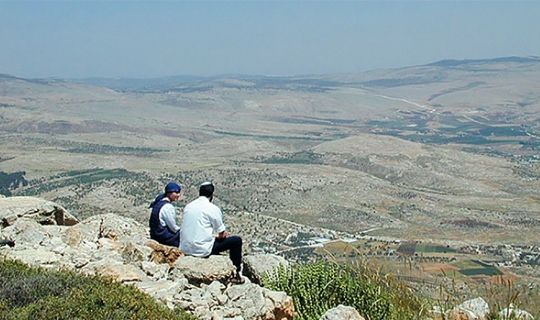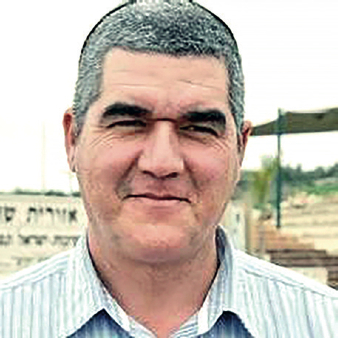
Jewish settlements are not an obstacle to peace
One of the important points of discussion during any Israeli-Palestinian peace negotiation is the settlements in the West Bank. Most of the time settlements are perceived as an obstacle to peace with the Palestinians. But what the people living in the settlements think? We discussed the subject with one of them. David Haivri is a consultant for public relations and social media. He is the founder and former director of the Shomron Liaison Office. He and his wife Mollie live in the Jewish settlement of Kfar Tapuach in Shomron with their eight children

David Ha’ivri
You are from the United States. When did you migrate to Israel and become a settler?
I was born in the United States. I came to Israel as a child with my family when I was eleven years old, in 1978. My family made Aliyah. Aliyah is a Hebrew word that means elevation. In Jewish culture we believe that a Jewish person who returns to the land of Israel is ascending up to higher grounds. I lived in Israel for most of my life. I went to high school, I did my mandatory military service, and I got married. We lived a bit in Jerusalem and we came to Kfar Tapuach in Shomron. We lived here for about 25 years. We have a home that we built and we have eight children. Some of our children are already young adults. Two of our young men are in the military right now. Our daughters are involved in education. Some as educators, some as students.
What in your background led you to become a settler?
For us, Samaria is the center of Israel; it is the heart of the land of Israel. It is very significant for the Jewish people to live here, to reconnect to our heartland. I teach Bible and through the Bible we learn the historical, religious, cultural connection of the Jewish people to the land of Israel. All of the events that we read in the Bible occurred here in Judea and Samaria. That is the beginning of the connection of the Jewish people. Of course there are other considerations regarding the security, strategic importance of this region for the state of Israel. Just as regular people, why did we choose to live here? This was a nice place for us to start out as a young family and to build our house, our family.
People have negative views about Jewish settlers. They are presented as religious fanatics. Are they?
There are all kinds of people living in Judea and Samaria or the West Bank (Yehuda and Shomron in Hebrew).
The majority of the Jewish settlers in the Samaria are not considered religious. Some Jewish people living here very well might be religious fanatics and many people who live here are religious. I don’t know if they need to be coined as fanatics. They are very serious about their observance of the Jewish faith. In my opinion all Israelis have a connection to the Jewish culture and heritage that stands out of our Jewish religion. I think that the majority of the people who live in Jewish communities in Judea and Samaria are positive people who bring on a positive light to Israel’s society in general.
How is the daily life in Shomron? Is it dangerous to live there? Last summer Palestinian terrorists kidnapped three teenage Israeli boys from a bus stop near their school in Gush Etzion, a settlement just outside Jerusalem, as they were heading home. This provoked spiral of violence that led to war in Gaza.
Daily life in Shomron is very similar to daily life everywhere. Is it dangerous? It is dangerous all over. There is terrorism, acts of violence everywhere around the world. Last week we saw a terrible act of terror in a church in Charleston, South Carolina against people, who were worshipping, by a very sick individual. There were terrorist attacks in Iraq; Muslims killed Muslims through terror. There is terror and acts of violence here too. A student bus was attacked in the Jordan Valley. The point is that there is danger everywhere, extremists are everywhere. That does not pass over the area that we live in. But in general life here is good. We have a very positive community and a good atmosphere to raise our children, a very good educational system. We need to be careful. We need to be aware of dangers that might exist and protect our family and go on with life.
We also hear about settler violence against Palestinians…
I think there are rather popular terms, headlines, teasers that we see in the news that don’t always reflect the facts on the ground. Any type of vandalism that might be discovered, carried out against an Arab target in Israel is very quickly addressed. But in general that does not reflect the majority of our experience in Israel. Most of the time people are just going about their lives, not involved in violence on either side; not as victims and not as perpetrators. Media is always looking for those acts of violence. The media is always looking for cases of a Jew who has acted in a violent way because that is something that the news can exploit for more headlines.
The consensus of the international community is that the Israeli settlements in territory it captured in 1967 are illegal, violating the terms of the Fourth Geneva Convention. Israel disputes this judgment, contending that the Fourth Geneva Convention applies only to the occupation of territory of another sovereign state. Settlements are perceived as an obstacle to peace with the Palestinians. What do you think?
I agree with the argument that the Fourth Geneva Convention does not refer to the situation of Israel’s taking of Judea and Samaria or the West Bank in 1967. The term West Bank came about historically in 1948, when Hashemite Kingdom of Trans-Jordan crossed over the Jordan River and captured this part of the land of Israel and controlled this area illegally for 19 years. Jordan turned this area to the West Bank as the Hashemite Kingdom was the East Bank.
I do not think that the Jewish communities in the Samaria are an obstacle to peace. People who point out that, are not really interested in peace. It is kind of outrageous, unbelievable that someone would say; I am willing to live with you in peace if you don’t live here. What is peaceful about that? Jewish people have every right to live in the heartland of the land of Israel. It is the biblical land of Israel. Israel took this land from an illegal occupier who is the Hashemite Kingdom of Trans-Jordan. In 1967, Israel was forced to a war by its Arab neighbors Egypt, Syria and Jordan. And Israel took the West Bank from Jordan. This is not what the Fourth Geneva Convention is speaking about when it forbids countries from settling their population in lands that are occupied. The Fourth Geneva Convention applies to a territory that was part of a sovereign and recognized country. Jordan was not recognized as the owner of this land. Jordan conquered and annexed this land in 1948. Only two countries recognized Jordan’s claim to this land; Great Britain and Pakistan. Even the Arab League did not recognize Jordan’s control over the West Bank. Israel took this land in a defense war in 1967. The Fourth Geneva Convention does not hold and does not forbid Israel from establishing Jewish community in this area. At best this area could be served as a disputed area. There never was a Palestinian state and in my opinion the idea of establishing a Palestinian state here is wrong in so many different ways.
Jewish settlements are not an obstacle to peace. Jewish communities provide an established infrastructure that is enjoyed by the entire population; Jews, Arabs, Christians. The international community should be supportive of Israel’s building of Jewish communities in Judea and Samaria.
How are the perceptions of the settlement movement inside Israel? It seems that a united Jerusalem is indispensable whereas land for peace formula is acceptable for the West Bank.
There are many different opinions among Jewish people and that is not a surprise. There is a joke that says “If you have two Jews, you have three opinions.” After the Gaza pullout in 2005, this idea of giving over land to Palestinians is much less popular than it was in the past. Even those who thought in the past that giving land to Palestinians could advance peace have been approved wrong in Gaza pullout. When Israel pullout of Gaza, it destroyed all the Jewish communities there and displaced all the Jewish people there. And as a result the Palestinians held democratic elections and elected Islamic Hamas as their government and since than there has been off and on fighting. Thousands and thousands of rockets have been fired from Gaza into Israel. I think that very few Israelis would like to experience that second time around by giving over Judea and Samaria to the Palestinians.
Do you support two states for two people solution; a demilitarized Palestinian state that recognizes the Jewish state?
I object to divide the land of Israel into two states. The land of Israel from the Jordan River to the Mediterranean Sea is only 70 km. There is not enough room to establish two states. Israel could not be divided. Israeli and Palestinian society have become interlocked in so many different ways that dividing the country is impossible, unconceivable. Its time has passed. This idea is old and irrelevant to the current situation. I object because Judea and Samaria is the core of the land of Israel. There are hundreds of thousands of Israelis who live in this land. There is no reason to give it over.
What do you think about the non-Jewish citizens of Israel? Should the Arabs stay as part of the Israeli society?
There is a large minority of non-Jewish citizens within the state of Israel who have full citizenship. Many of them are loyal to the Jewish state and take part in Israeli society in important positions such as judges, military leaders, and members of the government… In any country there are different ethnic groups and Israel is an ethnic Jewish state. It is the only Jewish state in the world. The Jewish fabric of the society and culture should be protected for the future. Minorities should have their own personal rights but they do not have the right to change the culture or the character of the state of Israel.
How true peace can emerge in the region?
The true peace will come in this region when the Middle East acknowledges that Israel is a fact and part of the Middle East. And when Israel is ready to acknowledge that Israel is part of the Middle East. Currently Israel is very western orientated and looks to the West. But Israel needs to realize that this is where we are. We are in the middle of the Middle East. We need to show respect to our neighbors and expect respect in return. I believe that mutual respect in the Middle East is possible. And then there will be peace in the Middle East.
Related Newsss ss













